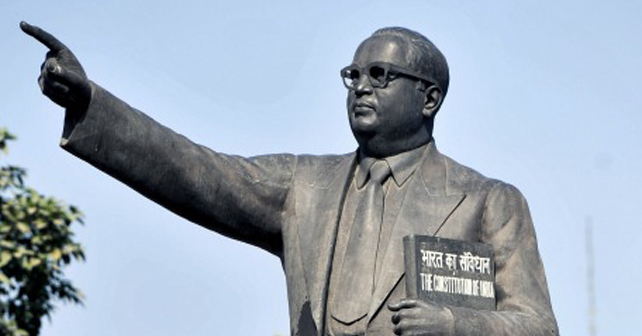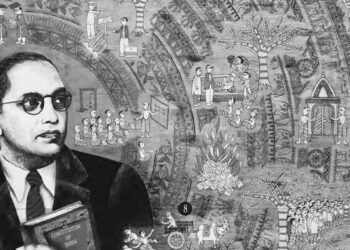(The text of the address delivered by Dr. B. R. Ambedkar in response to the Civic Address presented to him by the Municipal Corporation of Madras on 22nd September 1944)
“The Governing class in this country is the Brahmin community. The 1937 elections resulted in our having Brahmin Prime Ministers in seven provinces with half the Ministry as Brahmin. If National Government was formed and if it goes into the hands of the Governing Class, do you really think that it will do better than the present Government of India which was criticised so much?
It is a very kind thought on your part to have decided to present me this address of welcome to your city. I am not a resident of Madras, and having played no part in civic life as such, I have no claim on your consideration. Nonetheless you have decided to present this address to me. I feel deeply grateful because it is something to which I cannot lay any claim. If I may refer to the fact and I do so without any sprit of controversy or criticism, I read in the papers that this address was not voted unanimously and that there was some amount of dissent (Laughter). I refer to this because I feel that I should welcome the address all the more than I would have done, if it was voted unanimously. Most of the acts which we do unanimously are either formal or acts which are nothing more than “conventional lies of civilisation” which we practically do every day which have no meaning at all (cheers). It is an indication at any rate that there was a part of the corporation which was sincere and insistent on presenting me this address.
Reference had been made to the work of the Madras Corporation in respect of the slum clearence, food for the children of working classes. It would not be appropriate if I were to parade what the Government of India has done in this connection. However, just to ward off criticism that has been sometimes levelled against the Government of India that it is a very slow machine and grinds very slowly. I may say that the Government of India during the last few years has not been an ideal body waiting upon time to carry out some of the most necessary reforms which every Government is bound to perform. I wish to refer to a great piece of work which Government of India has done for the working population during the last few years. I would refer to the scheme of technical training which has imparted skill to unskilled men to the extent of 68,000 people. There are three to four hundred training centres spread throughout India and it is our hope and aspiration that the scheme of technical training which we have built up will not be scrapped at the end of the war and that it would be a permanent part of the educational system of this country whereby children of the working classes who had no opportunity of reaching university education could have the opportunity of having better skill and thus improving their earning capacity (cheers). There are several places of legislation which the Government has put through during war. For instance, there is the provision of compulsory arbitration of industrial disputes. Hitherto the Government of India has no authority to prescribe terms and conditions of employment of workmen. It was only a matter for the private individual with nothing more than a private contract between a worker and employer to determine the wages and conditions of employment. Today we have a law whereby if the Government of India was satisfied that the terms and conditions of employment were not satisfactory they had the authority to impose terms and conditions which they thought were right and proper. I hope that although this piece of legislation has emerged as a result of the war, it will not die with the war and that it would become a permanent of our legislation system in the country (cheers). What we have done, we are conscious, is indeed very small. But I do want the public to understand that the Government of India in the matter of legislation is not in a very happy position.
Many people criticise the Government of India and I wonder whether it is worthwhile doing so. The Government of India may not have done much; but does it matter? To me, it seems, present, it does not. After all, the question is whether the New Government of India has done or will not do, the question to my mind which we all call National Government will do better. Let me humbly submit that it is a far more crucial question than the question which we are all thinking about. I am quite prepared to admit for the purpose of argument that the present Government of India may be taken as caretaker’s Government. We are all looking forward to a new Government and the quest of questions which worries me is, will this National Government do better? I also express a certain degree of doubt. We are all saying that once we are given a power, adult suffrage, we will sweep all evils, make clearances, put everybody on the boulevards so that they can walk erect as human beings. I entertain grave doubts. I have studied sufficiently the history of European Government and I have been one of those who has been completely disillusioned of the allegation that has sometimes been made that all human evils will disappear once a parliamentary Government is established based upon adult suffrage. History gives no foundation and no support for a proposition of this kind. None whatever it seems to me that we are suffering from certain disillusionments or asking false questions ourselves. It is right to say that whether you have adult suffrage, or not, or a framework of a popular Government or a framework of any other Government, there is inherent in every society in every country, two classes – the Governing class and the subject class. Whether they come on the surface or whether they are hidden behind some kind of clouds, makes no matter. You give adult suffrage or any kind of power or election what happens is this. The Governing class is elected to govern, the subject class never gets a chance. Am I making a wide statement? I do not think so. There is a foundation for what I say.
“In the seven provinces, we had Brahmin Prime Ministers. Half the Ministry was Brahmin in composition. I am not saying this as a matter of criticism, but I am only stating facts.”
Let us examine the results of the elections in 1937, we had the widest of suffrage, the results of elections and true votes. What happened in the seven Congress provinces? I do not wish to speak about it – what I said then came to be true and the truth was that in this country, no matter what you do, you have got the Brahmin community as the Governing community (laughter). That came to surface. Nothing else did. In the seven provinces, we had Brahmin Prime Ministers. Half the Ministry was Brahmin in composition. I am not saying this as a matter of criticism, but I am only stating facts. If the elections proved anything, it proved only this that in the heart of this country there was one community that was destined to be the governing class. It has come as the governing class. I do not think we should ask the question whether every country is not entitled to self-government but we should ask whether the governing class in any country has a sense of responsibility so that the government of that country can be entrused to the community. We have forgotten the fact that the right to govern must be really decided in the light of the responsibility of the governing class. After all if the governing class is to govern, the question is, what is the outlook of that the governing class, what is philosophy, what does it believe in. If you have a governing class which believes in what you care graded inequality, one on the top of the other which does not believe in inequality, and believes that man is not man and he must not be touched and that a certain class alone is entitled to education and property and not the other and that the latter is born servile and must die in servility, the question that I ask is this. If a National Government was formed and if it went into the hands of the Governing class, do you really think that the Nation’s Government will do better than the present Government of India?
I am no opponent of a national Government, I am no opponent of Swaraj, I am no opponent of Independence. If I can be assured that I could have independence, education and welfare, which are promised to the nation. I certainly will fight for independence, for nationalism, for freedom (cheer & applause). But if all this long talk, tall philosophy is followed by nothing else then what we call “One step-dance” if it is confined to the Governing class and if political power is used to strengthen that community and to disfranchise the rights of others, then the present Government of India may not be criticised so much as it is being criticised now.
Courtesy: Dr.Babasaheb Ambedkar Writings and Speeches Volume 17 Part II, Published by the Government of Maharashtra.








